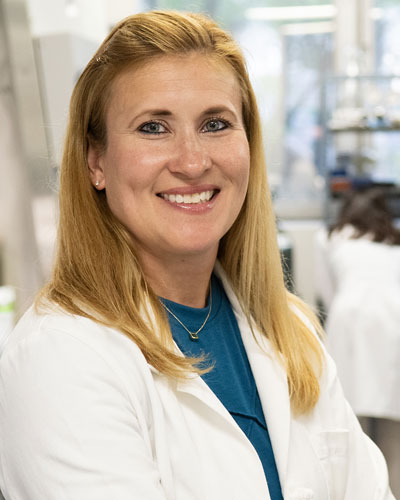PCOM Researcher Hopes New Model of SBMA Accelerates Search for Therapies
January 17, 2024A Philadelphia College of Osteopathic Medicine faculty member who specializes in basic and translational science research for spinal
bulbar and muscular atrophy (SBMA), also known as Kennedy's disease, is propelling
efforts to model and identify therapeutic targets for this neuromuscular disease with
two new grants.
Through awards from the National Institutes of Health (NIH) and the Kennedy’s Disease
Association, Heather L. Montie, PhD, an associate professor of Neuroscience, Physiology and Pharmacology, will continue
her research efforts to identify potential therapeutic targets for SBMA.
This adult-onset, X-chromosome-linked neuromuscular disease causes progressive difficulty
with walking, speaking and swallowing in men. There’s pressing need for such studies
because there is currently no cure or effective treatment for SBMA.
The NIH grant will support the creation of a new SBMA zebrafish model that stands
to expedite identification of molecular mechanisms of SBMA pathogenesis and discovery
or validation of therapeutic interventions.
Since SBMA shares properties with other neuromuscular and neurodegenerative diseases,
the ultimate hope is that therapeutic interventions identified for SBMA may also be
applicable to or help support therapeutic discoveries for other disorders.
“Creating this new zebrafish model of SBMA is aimed to enable higher throughput studies
in our research program and to support more collaborative projects with other SBMA researchers,” Montie said.
The project will also facilitate student research, as the accelerated speed of the modeling is conducive to research projects that
would allow PCOM doctor of osteopathic medicine or biomedical sciences students to obtain meaningful results in a few weeks or months, as opposed to longer
timeframes that other models can take.
The second grant from the Kennedy’s Disease Association supports Montie’s investigation
of the role the CD38 protein has in metabolic dysregulation in SBMA. This funding
will support ongoing studies in Montie’s lab to identify potential therapeutic interventions
for SBMA.
Ultimately, with new and hopefully better modeling of SBMA, Montie hopes that future
research could test for disease-modulating genes or screen libraries of drugs or compounds
that one day may help limit the devastating effects of this disease.
This work is supported by the NIH (1R03NS135339) and the Kennedy’s Disease Association.
About Philadelphia College of Osteopathic Medicine
Established in 1899, Philadelphia College of Osteopathic Medicine (PCOM) has trained
thousands of highly competent, caring physicians, health practitioners and behavioral
scientists who practice a “whole person” approach to care—treating people, not just
symptoms. PCOM, a private, not-for-profit accredited institution of higher education,
operates three campuses (PCOM, PCOM Georgia and PCOM South Georgia) and offers doctoral degrees in clinical psychology, educational psychology, osteopathic
medicine, pharmacy, physical therapy, and school psychology. The college also offers
graduate degrees in applied behavior analysis, applied positive psychology, biomedical
sciences, forensic medicine, medical laboratory science, mental health counseling,
physician assistant studies, and school psychology. PCOM students learn the importance
of health promotion, research, education and service to the community. Through its
community-based Healthcare Centers, PCOM provides care to medically underserved populations.
For more information, visit pcom.edu or call 215-871-6100.
Contact Us
For general media inquiries, please contact the Office of Marketing and Communications
at 215-871-6300 or communications@pcom.edu. Visit our media relations page to view contact information for public relations personnel.
Connect with PCOM

 A
A 